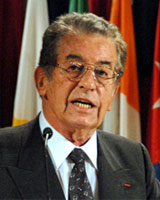President of the General Conference
George N. ANASTASSOPOULOS - Biography

George N. Anastassopoulos, the President of the thirty-fourth session of UNESCO’s General Conference, is a seasoned politician whose past and current functions testify to his unwavering commitment to democracy and its institutions.
Latest speeches & statements
Press releases
George N. Anastassopoulos became the Ambassador and Permanent Delegate of Greece to UNESCO in November, 2004. Prior to holding this position, he was Vice-President of the Constantinos Karamanlis Institute for Democracy. Since January 2003, he has also been the President of the Greek-American Education Foundation, in charge of running Athens College and Psychico College, one of the biggest Colleges in Greece and of the most well known schools of Europe.
Before taking on these responsibilities, George N. Anastassopoulos spent over ten years as a member of the European Parliament. First elected in 1984, he was re-elected in 1989 and 1994. During his mandates, he was twice elected Chair of the Transport and Tourism Committee and Chair of the Conference of the Committee’s Chairmen. During the decade extending from 1989 to 1999, he was elected four times to one of the vice presidential positions of the European Parliament. In this context, he presented 24 reports on behalf of different Committees (institutional, rules, transport and legal) to the plenary and six reports to the Bureau.
His national political career began in 1977 when he became Under-Secretary to the Prime Minister and official spokesperson for the Governments of Constantinos Karamanlis (1977) and George Rallis (1981) and Chairman of the All Parties Committee supervising the 1981 national legislative elections.
Before entering politics, George N. Anastassopoulos pursued an extensive career in journalism, beginning as a journalist with the daily “Kathimerini”, where he became the senior political correspondent, contributing at the same time to other Athenian dailies and magazines. After the publication of one of his articles strongly criticizing the Colonel’s regime, the government closed “Vradini” newspaper on 1 December 1973. At the same period, he never ceased to contribute leading articles to clandestine newspapers.
After the restoration of democracy, George N. Anastassopoulos became Director General of the Athens News Agency (1974-1981) and Director of the “Messimvrini” daily (1983-1984). He was elected member of the Board, Vice-President and then four times President (1976-1984) of the Athens Union of Journalists, the strongest journalist union of Greece. He was also elected member of the Board of the International Federation of Journalists (1978-1984).
George N. Anastassopoulos, fluent in both English and French, is married and is the father of two children.
Honours
He has been honoured with the decorations of Grand Commander by Germany, Italy, Portugal, Argentina and Egypt, as well as the French Légion d’Honneur and the Robert Schuman medal.
Education
George N. Anastassopoulos was born in Kifissia, Athens. He graduated from Athens College and the Law School of the University of Athens and pursued postgraduate studies in European Comparative Law at King’s College, University of London, and in Modern Journalism Techniques at the Medill School of Journalism, Northwestern University, U.S.A. He obtained his Ph.D in Law from Panteion University.
Publications
He is the author of several books:
- “The 1992 challenge” (with others) 1988,
- “Horizontal Production” (1994),
- “Tendencies in view of the 1996 Intergovernmental Conference” (1995),
- “Double Thread for Community Law” (1996),
- “Common Principles for a European Electoral System” (1998),
- “Constantinos Karamanlis: Myth and Truth”(2001),
- “Introduction to European Studies”, (with others), (2001),
- “The conflict on the system of electing the members of the European Parliament (2002),
- “The debate on the system of electing the members of the European Parliament” (2002).

